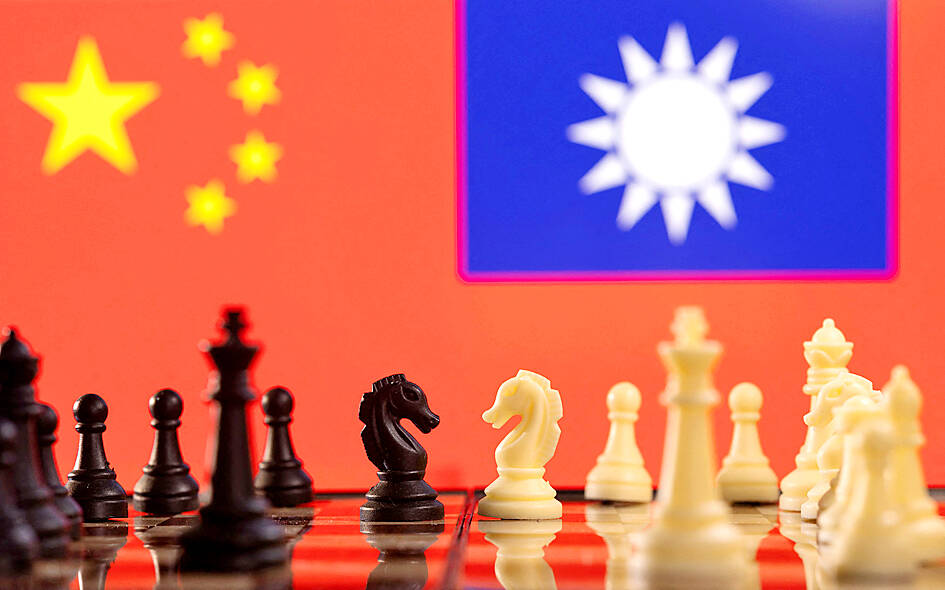Democratic Progressive Party (DPP) Legislator Puma Shen (沈伯洋) and other lawmakers have proposed amendments to the Criminal Code defining four crimes of collusion with foreign powers.
As collusion, which is currently not well-defined under the law, carries a severe penalty, judges tend not to invoke it, Shen said.
After consulting with the National Security Bureau, he and other DPP members have proposed defining four types of criminal behavior that would fall under the category of collusion.

Photo: Reuters
They are publicly declaring or recognizing the right of a foreign power to exercise rule over the Republic of China (ROC); failing to perform one’s official duties as a civil servant of the ROC or committing acts that contravene those duties at the request of a foreign power; assisting a foreign power in attempting to exercise authority over the sovereign territory of the ROC; and endorsing the claims of a foreign power of sovereignty over the territory of the ROC, whether through participation in meetings, signing of petitions or other means.
The draft also sets out hierarchical penalties for different targets, mainly civil servants.
Highest in the hierarchy is the president and vice president, followed by elected public officials; heads and deputy heads of agencies; high-ranking members of the Executive Yuan; justices, examination committee members and members of supervisory committees; and diplomats.
The hierarchy also includes noncommissioned officers and other military personnel, heads of political parties, police officers, Coast Guard Administration personnel, customs officers, firefighters, civil defense committee members, and those in charge of the operations of critical infrastructure, among others.
Civil servants found guilty of collusion could receive up to life imprisonment, while non-public servants would face fixed prison terms of one to seven years, Shen said.
Not all actions perceived as “united front” activity would be punishable under the amendment, he said.
“There are many artists in Taiwan this year who have made pro-China statements, but those artists operate in a free market after all, and it is their personal freedom to pursue opportunities in China,” he said.
However, professors or government officials making such statements are at higher risk of facing legal consequences, he said.
Lawmakers are concerned that current laws encompass a gray area, which China would take advantage of, he said, adding that further revisions would be likely.
Separately, DPP Legislator Chiu Chih-wei (邱志偉) has proposed an amendment to Article 8 of the Anti-Infiltration Act (反滲透法), which would call for the Constitutional Court to rule on the dissolution of a political party in the event that the party or its key members commit acts that contravene the Constitution, disrupt social order or affect national security.

TRAGEDY STRIKES TAIPEI: The suspect died after falling off a building after he threw smoke grenades into Taipei Main Station and went on a killing spree in Zhongshan A 27-year-old suspect allegedly threw smoke grenades in Taipei Main Station and then proceeded to Zhongshan MRT Station in a random killing spree that resulted in the death of the suspect and two other civilians, and seven injured, including one in critical condition, as of press time last night. The suspect, identified as a man surnamed Chang Wen (張文), allegedly began the attack at Taipei Main Station, the Taipei Fire Department said, adding that it received a report at 5:24pm that smoke grenades had been thrown in the station. One man in his 50s was rushed to hospital after a cardiac arrest

A car bomb killed a senior Russian general in southern Moscow yesterday morning, the latest high-profile army figure to be blown up in a blast that came just hours after Russian and Ukrainian delegates held separate talks in Miami on a plan to end the war. Kyiv has not commented on the incident, but Russian investigators said they were probing whether the blast was “linked” to “Ukrainian special forces.” The attack was similar to other assassinations of generals and pro-war figures that have either been claimed, or are widely believed to have been orchestrated, by Ukraine. Russian Lieutenant General Fanil Sarvarov, 56, head

SAFETY FIRST: Double the number of police were deployed at the Taipei Marathon, while other cities released plans to bolster public event safety Authorities across Taiwan have stepped up security measures ahead of Christmas and New Year events, following a knife and smoke bomb attack in Taipei on Friday that left four people dead and 11 injured. In a bid to prevent potential copycat incidents, police deployments have been expanded for large gatherings, transport hubs, and other crowded public spaces, according to official statements from police and city authorities. Taipei Mayor Chiang Wan-an (蔣萬安) said the city has “comprehensively raised security readiness” in crowded areas, increased police deployments with armed officers, and intensified patrols during weekends and nighttime hours. For large-scale events, security checkpoints and explosives

PUBLIC SAFETY: The premier said that security would be tightened in transport hubs, while President Lai commended the public for their bravery The government is to deploy more police, including rapid response units, in crowded public areas to ensure a swift response to any threats, President William Lai (賴清德) said yesterday after a knife attack killed three people and injured 11 in Taipei the previous day. Lai made the remarks following a briefing by the National Police Agency on the progress of the investigation, saying that the attack underscored the importance of cooperation in public security between the central and local governments. The attack unfolded in the early evening on Friday around Taipei Main Station’s M7 exit and later near the Taipei MRT’s Zhongshan